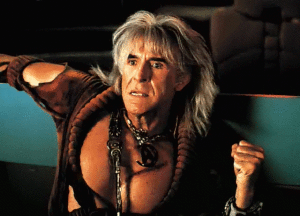 Ricardo Montalban, the dashing, suave actor, perhaps best known for his role as Khan in Star Trek: Wrath of Khan and as Mr. Roarke on television’s Fantasy Island, passed away January 14th in Los Angeles at the age of 88.
Ricardo Montalban, the dashing, suave actor, perhaps best known for his role as Khan in Star Trek: Wrath of Khan and as Mr. Roarke on television’s Fantasy Island, passed away January 14th in Los Angeles at the age of 88.
Fashionably dressed in a striking white suit and black tie, Montalban portrayed the mysterious Mr. Roarke with a humbling charisma while presiding over a tropical island resort where visitors fulfilled their lifelong dreams — “I am Mr. Roarke, your host. Welcome to Fantasy Island,” he told arriving guests. Each guest would soon recognize Roarke controlled their fate, even if it equaled death.
Born Ricardo Gonzalo Pedro Montalban y Merino in Mexico City, on November 25, 1920, he immigrated to the United States in 1936. Montalban studied English at California’s Fairfax High School and was offered a screen test by an MGM scout who’d seen him in a student play, but Montalban’s brother persuaded him to pass on the offer and they both headed to New York City. Montalban worked as a bit player on Broadway; his most notable role in 1940’s Her Cardboard Lover. However, the illness of his mother forced his return to Mexico in the early 40s.
A one-line role in a The Three Musketeers spoof launched his film career and Montalban went on to act in 13 Spanish-language films. He was quickly becoming a star and would have stayed in his native Mexico, but MGM enticed Montalban to come to Hollywood by offering him a role opposite Esther Williams in their upcoming colorful musical, Fiesta (1947). In the film, Montalban plays Williams’ brother who would rather compose music instead of becoming a matador. In his first Hollywood film he sparkles, but not with Williams, but rather, a young Cyd Charisse, Montalban’s dance partner and love interest.
Fiesta earned him a contract at MGM as one of their two typecast Latin lovers; the other was friend and rival, Fernando Lamas (Williams’ off-screen husband). Montalban starred with Williams in two other late-40s pictures, On An Island With You (1948) and 1949’s Neptune’s Daughter. Montalban’s first serious assignment and true leading role was in acclaimed genre-director Anthony Mann’s gritty drama, Border Incident in 1949. Director John Sturges gave Montalban the leading role of Lt. Peter Morales in the noir Mystery Street in 1950 and, that same year, a starring role with June Allyson and Dick Powell in Right Cross.
After MGM dropped him in 1953, Montalban worked on the stage and on-screen. Folks could see his Tony-nominated role in Jamaica with Lena Horne, and respected his turn as a Kabuki theatre actor in WB’s 1957 hit, Sayonara.
Major film roles diminished for Montalban by the early 1970s and he quickly turned to television as his preferred medium. He captivated audiences for six straight years – Fantasy Island received high ratings for most of its run on ABC, and still appears in reruns. Mr. Roarke and his sidekick, Tattoo, played by the 3-foot, 11-inch Herve Villechaize, reached the state of TV icons.
Trek fans rejoiced upon hearing Montalban would reprise his role for Star Trek: Wrath of Khan, the second chapter of the Star Trek feature length films. Montalban first played Khan in a 1966 TV episode entitled “Space Seed.” To perfect the role, he watched his original 1966 performance to recall the character of Khan, as Montalban was worried that in read throughs he sounded and acted too much like Mr. Roarke. Beloved critic Pauline Kael noted Montalban’s performance as Khan “was the only validation he has ever had of his power to command the big screen.”
In the late 1990s and early 2000s Montalban’s career saw a bit of a welcomed resurgence when he chose to voice characters on the popular animated kid’s shows Dora the Explorer and Kim Possible. Montalban even had the opportunity to grace the big screen once again in Robert Rodriguez’s Spy Kids franchise. Rodriguez, who had idolized Montalban for some time, asked him to appear as the benevolent grandfather in the 2nd and 3rd installments. Montalban made a gentlemanly attempt to decline but Rodriguez and his loving tenacity won out.
Montalban was warmly recognized as a revolutionary in Hollywood. He was one of the very first Latino actors to break into Hollywood and was unafraid to voice his feelings about the mistreatment of Latinos in the industry. By establishing Nosotros — “we” in Spanish – Montalban attempted to highlight and recognize Latino participation in the arts and entertainment and was respected for his dedication.




